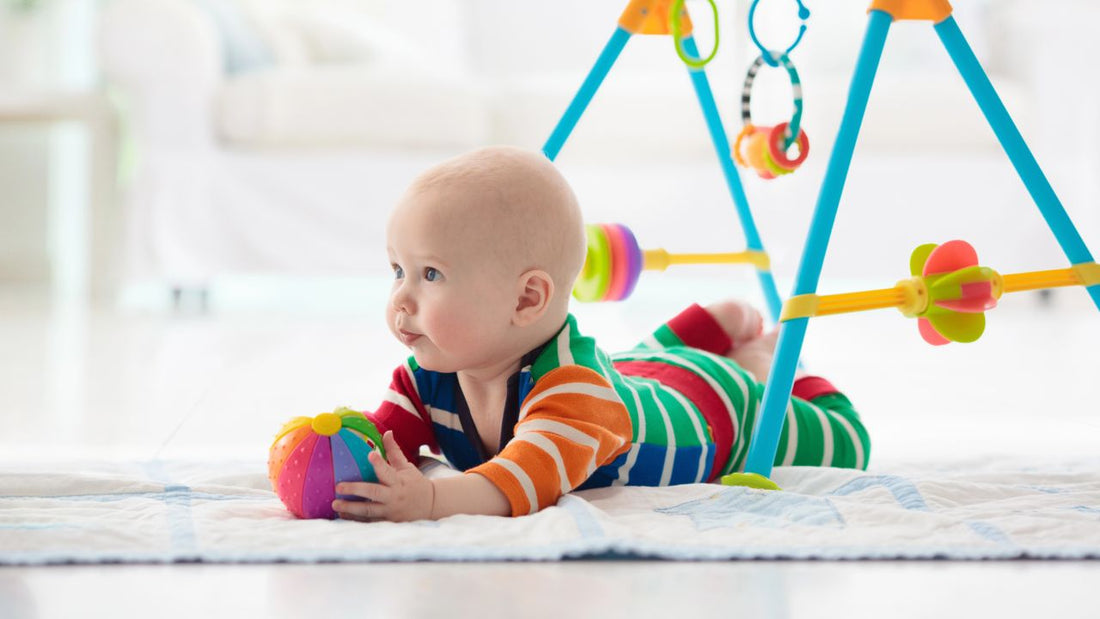
Sensory play ideas for babies that support everyday development
Share
Sensory play ideas for babies are more than just fun, they help build early skills from the moment your little one starts exploring the world. Whether you're a new mum or preparing for your first baby, understanding how sensory play works can make everyday moments more meaningful.
Let’s break it down.
What is sensory play and why does it matter
Babies learn through touch, sound, sight, taste, and smell. Sensory play gives them a chance to explore these senses in safe, simple ways. Sensory activities can support motor skills, language development, and emotional regulation from birth to two years.
Here is why it matters:
- It helps babies build neural connections
- It encourages movement and coordination.
- It supports bonding between parent and child.
Sensory play ideas for babies 0-6 months
At this stage, babies are just beginning to respond to textures, sounds, and light. Keep things gentle and close to the body.
Tummy time with textures
Lay your baby on a soft surface like a linen play mat. Add textured cloths, crinkly paper, or silicone toys around them. The natural softness of linen is gentle on sensitive skin and hypoallergenic making it perfect for daily use.
High-contrast cards
Black-and-white cards stimulate visual development. Place them on the mat during tummy time or hang them nearby.
Scented socks
Fill clean socks with dried herbs like chamomile or mint. Let your baby smell and squish them while lying on their mat.
Sensory play ideas for babies 6-12 months
As babies grow, they start grabbing, mouthing, and crawling. This is a great time to introduce more interactive play.
Sensory bags
Fill resealable bags with water beads, glitter, or soft pom-poms. Tape them to the floor or window. Babies can squish and poke safely.
Taste-safe mud
Mix cocoa powder with flour and water to create edible mud. Scoop it into a shallow tray on your linen mat and let your baby explore.
Rainbow rice
Dye rice with food colouring and let it dry. Pour into a bin and add scoops, spoons, and small toys. This activity builds fine motor skills and keeps babies engaged.
Sensory play ideas for babies 12-18 months
Toddlers love to move, stack, and sort. Sensory play can help channel that energy into learning.
Texture treasure basket
Fill a basket with safe household items: wooden spoons, soft brushes, sponges, and linen scraps. Let your toddler explore and name each item.
Frozen pea bin
Pour frozen peas into a tray and let them thaw. Babies can scoop, squish, and even taste them.
Sensory fort
Use your linen play mat as the base. Drape lightweight blankets over chairs to create a fort. Add soft toys, books, and textured items inside.
How to setup a sensory space at home
You don’t need a dedicated room. A corner of your living area works well. Here’s what to include:
- A washable, soft surface like a French linen play mat
- A basket of rotating sensory items
- Natural light and calm surroundings
- A few baby-safe mirrors or high contrast visuals
Wallaby Collective’s linen mats are machine washable, breathable, and designed for everyday use. They’re a great base for sensory play from newborn to toddler.
Safety tips for sensory play
Always supervise your baby during sensory play. Avoid small items that could be choking hazards. Wash hands before and after play, and clean surfaces regularly.
Choose materials that are non-toxic and gentle on skin. Linen is a great choice because it’s naturally hypoallergenic and easy to clean.
How linen play mats support sensory play
Wallaby Collective’s linen play mats offer:
- A soft, breathable surface for tummy time and crawling
- Hypoallergenic comfort for sensitive skin
- Easy machine washing for messy play
- Stylish design that fits into any home
They’re made with premium French linen and designed for babies aged 0–18 months. Whether you’re setting up a sensory fort or laying out a treasure basket, these mats make playtime easier.
Where to find more sensory play ideas
Here are helpful resources to explore:
Final thoughts
Sensory play doesn’t need to be complicated. With a few household items and a soft, safe surface like a linen play mat, you can support your baby’s development every day.
Try one new activity each week. Watch how your baby responds. And enjoy the little moments it's these that matter most.
